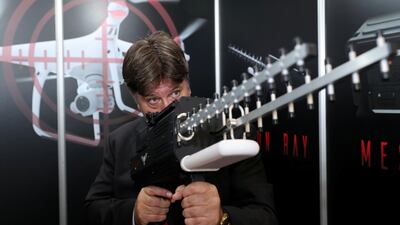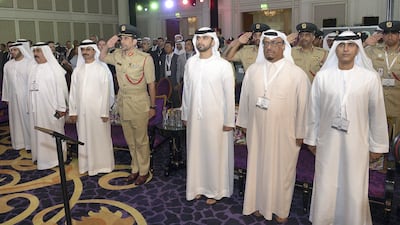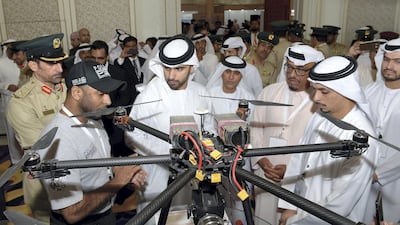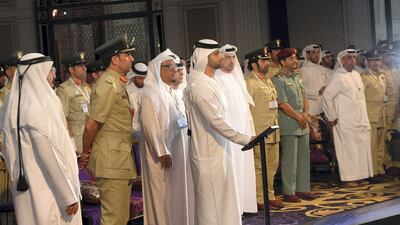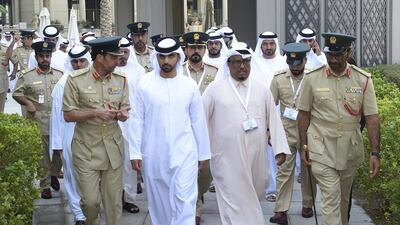A drone’s collision with a commercial aircraft in Canada - the first recorded in North America - was a timely reminder for authorities in the UAE of how legislation needs to tighten up airspace safety in Dubai.
Aviation experts discussed the latest innovations and industry demands at the Unmanned Aerial System Forum in Dubai on Monday, hours after reports emerged of a drone striking the wing of a Skyjet flight en route to Quebec City on October 12.
The aircraft landed safely with all passengers and crew unharmed, but the incident highlighted the importance of regulation over the latest threat to airline safety in the UAE.
Anti-drone technology is already in use in sensitive areas of the UAE, but the legislation over responsibility for damage and injury remains unclear.
Monitoring the import of drones into the UAE for recreational use is also a concern, experts said.
Although a licence and registration is required for hobbyists, many drones are imported as toys and freely sold in markets and toy shops with little regulation.
The loophole is posing a potential threat to air safety, according to Michael Rudolph, head of airspace safety section at the Dubai Civil Aviation Authority.
“We are looking at a number of technological solutions to bring down drones,” said Mr Rudolph.
“The issue we have is safely landing them. If you neutralise a drone, it is going to fall somewhere - but who is responsible if it falls onto someone or damages property?
“We are in the process of assessing all of the available technology to find a solution, and there is a lot of it.”
_____________________
Read more:
UAE moves to 'close the gate' on drone imports that fail to meet new criteria
Drones take bigger role in management of global power networks
Drones to watch Abu Dhabi roads to make sure rules are not broken
Watch: drone delivers Costa coffee on Kite Beach in Dubai
_______________________
Dubai Airport has a number of alerting systems to advise them of a drone penetration.
Mr Rudolph is more concerned about what anti-drone technology is going to do to disrupt commercial traffic in and out of Dubai.
“A lot of navigation systems on aircraft today have satellite derived flight procedures,” he said.
“If I have to neutralise the same frequency spectrum they have to use for navigation and the aircraft loses connectivity with a satellite, that could cause a major problem.
“There is no one solution. You can either protect an asset via a military application on a perimeter fence, or neutralise a drone which can also be problematic.”
Commercial drones are becoming more common in industry, and are now used to deliver coffee, parcels, blood packages to hospitals in remote areas and to monitor speeding traffic.
As the technology becomes more affordable and reliable, control over access to drones also needs to improve.
“The market imports drones as toys, which are not picked up by customs and they often end up at places like Dragonmart,” Mr Rudolph said.
“We identify most as toys, but the larger drones we are working on. It is critical we have protocols and process to work with Dubai Police and others to try and close that net.
“Then we can go from store to store to put the fear of god into retailers to show the problems this can cause.
“Like many other places in the world, people respect the law in the UAE and we are reliant on that being an effective deterrent.”
Those who don’t comply with the rules can face a Dh20,000 fine and up to five years in prison.
Canada announced it is now illegal to fly recreational drones within 5.5km of airports, and restricting the height of flight to 90 metres.
Pilots breaking the law face fines of 25,000 Canadian dollars (Dh73,400).
As well as the recent Quebec near miss, other close calls have been reported in the UK.
The UK Airprox Board reported a drone ‘flying into conflict’ with an Airbus 319 as it approached Gatwick Airport earlier this year.
Anti-drone technology available to airports was on show at UASF in Dubai.
Adnan Alshuaili, co-founder of Tayyar Systems and Technologies, was exhibiting his anti-drone technology in the form of an anti-drone gun and portable counter drone system.
The gun stops all frequencies used by the drone, including controlled communication and navigation systems.
“It can take down any commercial drone and capture the machine to retain any information. Most drones will gradually drop to the ground. Some will just fall from the sky," he said.
“Drones have become very affordable, easy to use and potentially dangerous.
“They have been weaponised and used for spying and to smuggle drugs into prisons.
“The technology we use has a range of two kilometres and is easy to use.”
The Sa’aq anti drone gun has night vision capable of spotting a drone at 300 metres.
Prices range from Dh50,000-100,000 depending on range and the company also offers a portable ‘no-fly’ zone that neutralizes drones to stop them flying near sensitive areas.
“Our customers are mostly the police, military and security agencies,” said Mr Alshuaili.
“We also supply big corporations and airports. This is not for public sale, as it is quite powerful and can be misused.”
The two-day Unmanned Aerial System Forum was inaugurated by Sheikh Mansoor bin Mohammed in Dubai on Monday.
